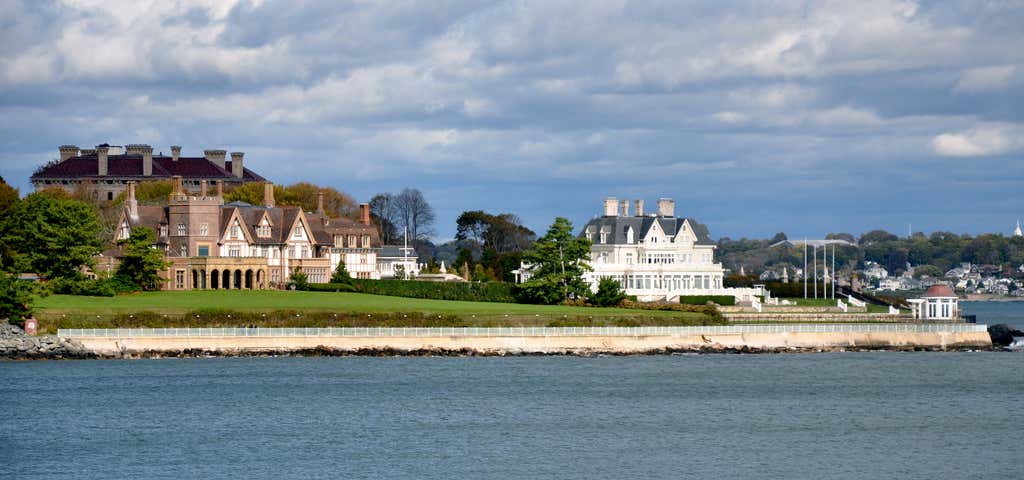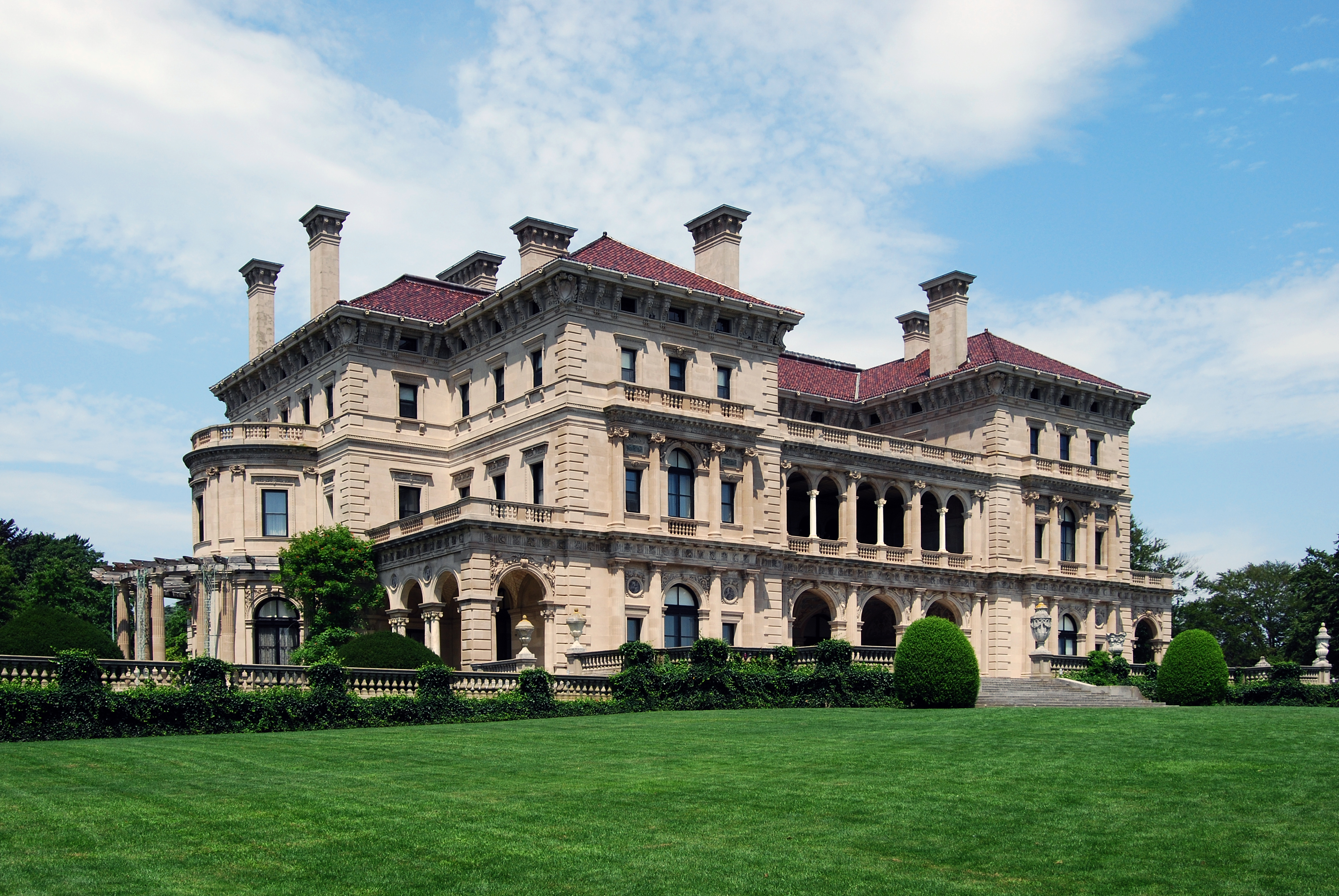It's not hard to see why so many Gilded Age barons and tycoons chose to build their mansions along the coast of Newport, Rhode Island: it's really quite breathtaking. The rugged shoreline, the deep blue water and the cool breezes make it especially lovely during the summer. In fact, so many wealthy people built homes along the shoreline in Newport that a 3.5 mile hike, called the Newport Cliff Walk, which runs along the coast, will take you past no less than 11 of the most impressive, squillion-dollar Gilded Age mansions! As you admire the architecture and landscaping of these luxurious homes, you'll also get to adventure through tunnels, across bridges, and past some of the prettiest ocean scenery in the East.
In 1975, the Cliff Walk was designated a National Recreation Trail. At only 3.5 miles, it's certainly doable for pretty much anyone, and most of it is flat and paved (although the last bit at the Southern end is on the rocky coast.) The trail itself winds behind the mansions along the ocean, so the breeze keeps you cool, and you can see lots of wildflowers and get in some good bird-watching, too. As you stroll along, take note of the mansions along the way... each has its own interesting history!
This "summer cottage" was built back in 1860, and in 1911 it was sold by Edmund Schermerhorn to another well-to-do family, the Morris-Gallatins. It remained with them until the 1980s, when they bequeathed it to the Newport Preservation Society. It still contains many of the original furnishings from the Morris-Gallatins, including some important paintings and family documents, and is one of the most well-decorated properties on the walk.
The second largest mansion in town is the chateaux-like Ochre Court, built by Ogden Goelet, an investment banker and competitive yachtsman (which is the most New England thing I've ever heard of.) He and his wife only lived there for eight weeks at a time each summer... which is insane, considering at cost $4.5 million to build back in 1892. It has 50 rooms and was staffed by twenty-seven house servants, eight coachmen and grooms, and twelve gardeners. The family then gifted the mansion to the Religious Sisters of Mercy in 1947, and the nuns (who lived in the servants quarters in the basement) used it to found Salve Regina University. Today, it houses the administrative offices for the college.
By far, the most famous Cliff Walk mansion is The Breakers. The Italian Renaissance-style home was built for Cornelius Vanderbilt II. With its Italian marble and French decor, it was meant to immitate the lavish homes of historically wealthy European families. With 70 rooms, it was the largest and most opulent of all of the Newport mansions. Beyond the expensive decor, the house is also tricked out with all kinds of old-school ammenities, like an elaborate dumbwaiter and intercom system for the servants, a special kitchen just for preparing confections, and a bedroom with four closets to accomodate for one daughter's seven daily outfit changes.
Chateau Sur-Mer was the biggest mansion on the block until the Vanderbilts came along in the 1890s. It is utterly lavish, and is one of the few homes here built for year-round use, as the Wetmore family, who built it, were from New England and made Newport their home. William Shepard Wetmore was a merchant who brokered goods from China, line tea, silk, spices, and paper, and furnished his home with unusual objects he collected on his travels. It's now a museum.
Isaac Bell was a cotton merchant, and the brother-in-law of the publisher of the New York Herald. It is built in the unique shingle style, which was popular in the Victorian era and is marked by wood detailing on the outside. The inside had a Japanese-inspired open floor plan... that is, until it was divided into apartments and turned into the world's most luxurious nursing home. It was bought by the Newport Preservation Society and restored to its former glory in the 1990s.
Kingscote is a dramatic Gothic Revival-style mansion constructed in the 1830s by a Southern plantation owner named George Noble Jones. It was sold to the King family when Jones left Newport at the start of the Civil War, and the King family kept the mansion, adding on tons more space, until the 1970s. It was one of the earlier Newport mansions that heavily influenced later homes. It's now open for tours.
Rosecliff was built by a silver heiress, the daughter of one of the original men who discovered the Comstock lode. The building was inspired by the Palace of Versailles... and was used as a filming location for the 1970's movie adaptation of The Great Gatsby. The second family to own the mansion was the Monroes, a southern clan from New Orleans who were known for their laid-back and easy-going parties, as opposed to the very formal affairs other couples hosted. They then donated it to the Preservation Society of Newport County, who opened it for tours.
The Astors' Beechwood Mansion is one of the older homes, built in 1850 for Daniel Parrish, a merchant from New York. It was later sold to the wealthy Astor family. John Jacob Astor IV died on the Titanic, and his wife Madeleine (who survived the disaster) inherited the place, eventually turning the entire third floor into her personal closet. The Astors also provided tours of the estate to tourists during the off-season. The 39-room estate has since been turned into an art museum.
Marble House was built by Alva and William Kissam Vanderbilt (William's older brother Cornelius was the one who built The Breakers). The 50 room mansion cost $11 million to build... and if you keep your eyes peeled, you can see the Chinese Tea House that Alva built to host suffragette rallies.
And, of course, when Alva Vanderbilt divorced William, she left Marble House (which she owned) and moved down the street into Belcourt Castle with her new husband, Oliver Hazard Perry Belmont. Belmont hated the nouveau riche who began building flashy homes on Bellevue Avenue, so out of spite, he made the entrance to his home off a different street, Ledge Road, and he had the back of his home facing Bellevue Avenue. Belmont eventually sold the place and it changed hands quite a few times, and even was the site of a million-dollar heist by bank robbers in the 1980s... although police managed to recover a lot of the stolen goods, some objects remain at large. While it had been previously open for tours, it is now a private estate, although you can walk by and admire it from afar.
Rough Point is one of the few that isn't French-inspired: Frederick William Vanderbilt had it built in an English manor style, and the family often rented it out to guests. It changed hands quite a bit until it was bought by James Buchanan Duke in the 1920s. When he died, he left it to his then-12-year-old daughter Doris, who fell in love with the property. Her pet Bactrian camels, Baby and Princess, who were gifts from a Saudi arms dealer, summered with her at Rough Point, and she even kept them in the estate's solarium during a hurricane in the 1990s. Her favorite treat for them? Peanut butter cookies. Doris Duke lived here on and off until her death in 1993, which is far longer than most houses had been occupied, and led to an interesting mix in furnishings; think, drapes from JC Penny in the same room as priceless antiques. The Newport Preservation Society has opened it for tours.
With so many historic homes to tour, it's not a bad idea to break visits to them up across several days, or just pick out one or two to visit. Each house definitely has its own personality and charm, a testament to the seriously interesting people who built and occupied these incredibly lavish estates, and you can even get a sense for that simply from the trail!
Roadtrippers
Roadtrippers helps you find the most epic destinations and detours—from roadside attractions to natural wonders and beyond.
Explore More Trip Guides
Roadtripping the Northeast: Witches, beaches, and ice cream
- 15 Places
- 37:31
- 1,922 mi
Summer Camp!
- 14 Places
Northeast Lighthouse Road Trip!
- 7 Places
- 20:21
- 992 mi














